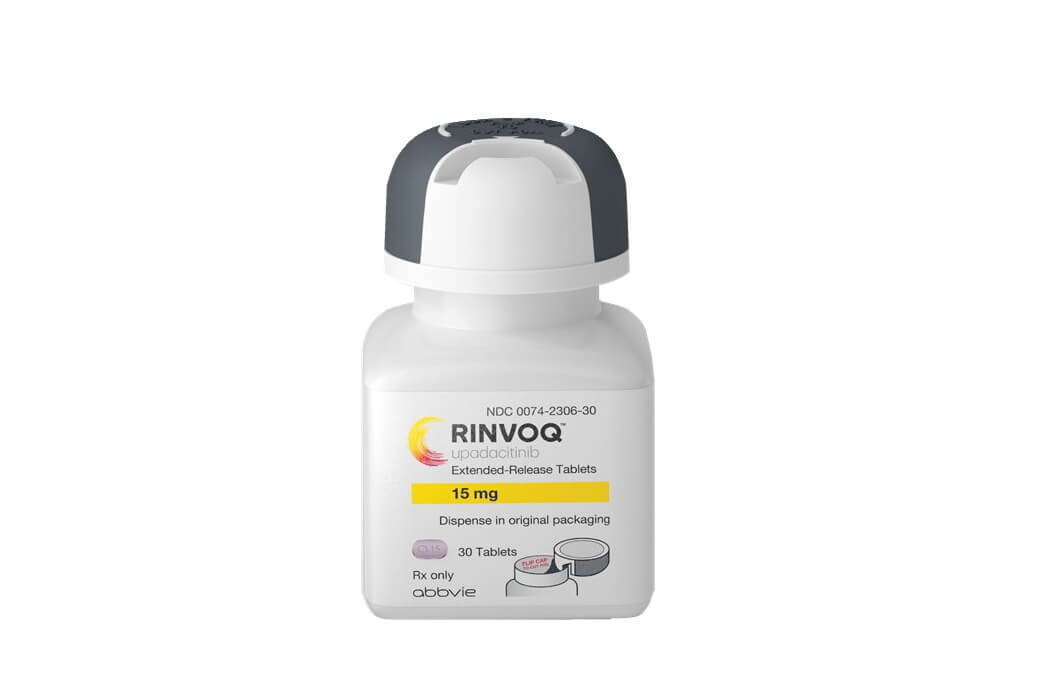Side Effects: Before starting to use, read the manufacturer’s Product Insert that comes with the medication. Please note that not all side effects can be listed here. Consult a healthcare provider if you experience any of these or other unexpected side effects. Some of the reported milder side effects include upper respiratory tract infections like a common cold or sinus infection, cough or bronchitis; shingles or cold sores; nausea, fever or headache; acne or mild allergic reactions, inflammation of hair follicles; abdominal pain or muscle pain. In general, these should pass within a few days. If they persist or get worse, report this to your healthcare provider or pharmacist immediately. Rinvoq may cause serious side effects, including: Reduced resistance to infections. Serious infections have been reported, including tuberculosis (TB). Your healthcare provider should test you for TB before starting Rinvoq and you should be checked during treatment with Rinvoq. You should not begin treatment with Rinvoq if you have any kind of active infection without the approval of your healthcare provider and if you get a serious infection, report this immediately to your healthcare provider, who may stop your treatment until your infection is controlled. For people 50 years and older who have at least one cardiovascular risk factor, there is an increased risk of major CV events, such as blood clots, heart attack, stroke, or death. Symptoms of a heart attack include Discomfort in the center of your chest that lasts for more than a few minutes or that goes away and comes back Severe tightness, pain, pressure, or heaviness in your chest, throat, neck, or jaw Pain or discomfort in your arms, back, neck, jaw, or stomach Shortness of breath with or without chest discomfort Breaking out in a cold sweat Nausea or vomiting In case of a stroke, the symptoms can include feeling lightheaded, feeling weakness in one part or on one side of your body and slurred speech Rinvoq may increase your risk of certain cancers, including lymphoma and skin cancers. Current or past smokers are at higher risk. Follow your healthcare provider’s advice about having your skin checked for skin cancer during treatment with Rinvoq. Limit the amount of time you spend in sunlight. Wear protective clothing when you are in the sun for prolonged periods, and use sunscreen. Reactions such as hives, difficult breathing, feeling faint or dizzy, or swelling of your lips, tongue, or throat may mean you are having an allergic reaction. If any of these symptoms occur during treatment with Rinvoq, stop taking the drug immediately and get emergency medical help. Risk factors Tell your healthcare provider if you are being treated for an infection, have a persistent infection, or have symptoms of an infection, such as: Fever, sweating, or chills Shortness of breath Warm, red, or painful skin or sores on your body Muscle aches Feeling tired Blood in your phlegm Diarrhea or stomach pain Cough Weight loss Burning when urinating or urinating more often than normal As well, be sure to inform your healthcare provider if you: Are taking medicines for fungal or bacterial infections, rifampicin or phenytoin or medicines that affect your immune system Have TB or have been in close contact with someone with TB Are a current or past smoker Have had a heart attack, other heart problems, or stroke Have or have had any type of cancer, hepatitis B or C, shingles (herpes zoster), blood clots in the veins of your legs or lungs, diverticulitis or ulcers in your stomach or intestines Have other medical conditions, including liver problems, low blood cell counts, diabetes, chronic lung disease, HIV, or a weak immune system Live, have lived, or have traveled to parts of the country, such as the Ohio and Mississippi River valleys and the Southwest, that increase your risk of getting certain kinds of fungal infections Have recently received or are scheduled to receive a vaccine. People who take Rinvoq should not receive live vaccines Are pregnant or plan to become pregnant. Based on animal studies, Rinvoq may harm your unborn baby. Your healthcare provider will check whether or not you are pregnant before you start Rinvoq. You should use effective birth control to avoid becoming pregnant during treatment with Rinvoq and for four weeks after your last dose Are you breastfeeding or plan to breastfeed. Rinvoq may pass into your breast milk. Do not breastfeed during treatment with Rinvoq and for six days after your last dose.

